Unit 13 We're trying to save the earth!Period 1(Section A 1a-2d)知识点课件(共15张PPT)
文档属性
| 名称 | Unit 13 We're trying to save the earth!Period 1(Section A 1a-2d)知识点课件(共15张PPT) |
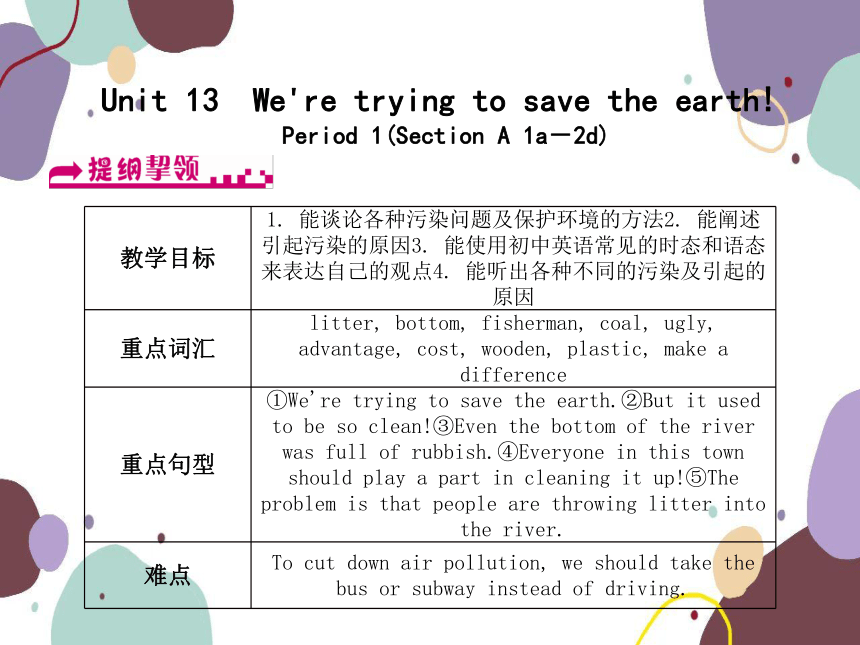
|
|
| 格式 | pptx | ||
| 文件大小 | 228.9KB | ||
| 资源类型 | 教案 | ||
| 版本资源 | 人教新目标(Go for it)版 | ||
| 科目 | 英语 | ||
| 更新时间 | 2022-10-25 00:00:00 | ||
图片预览

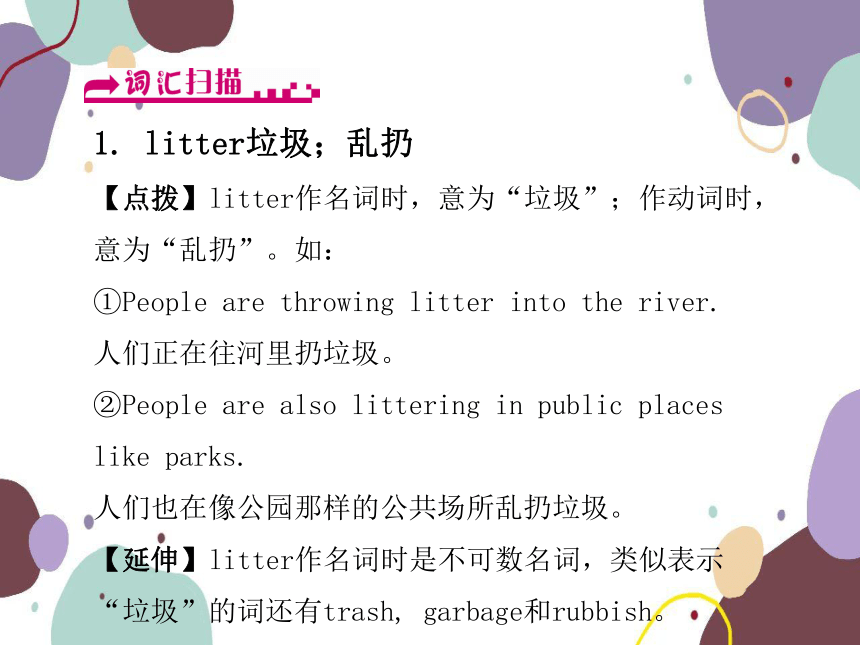
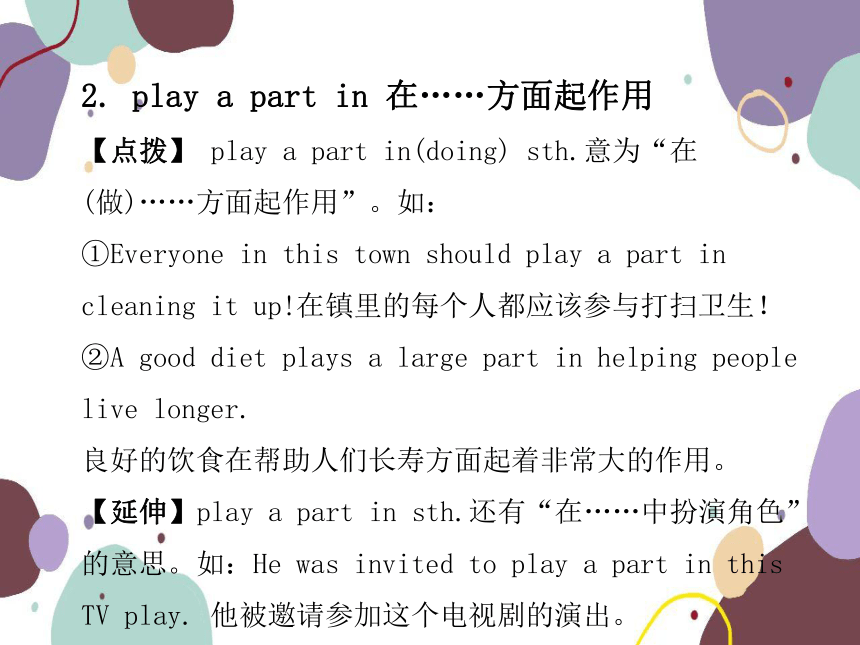
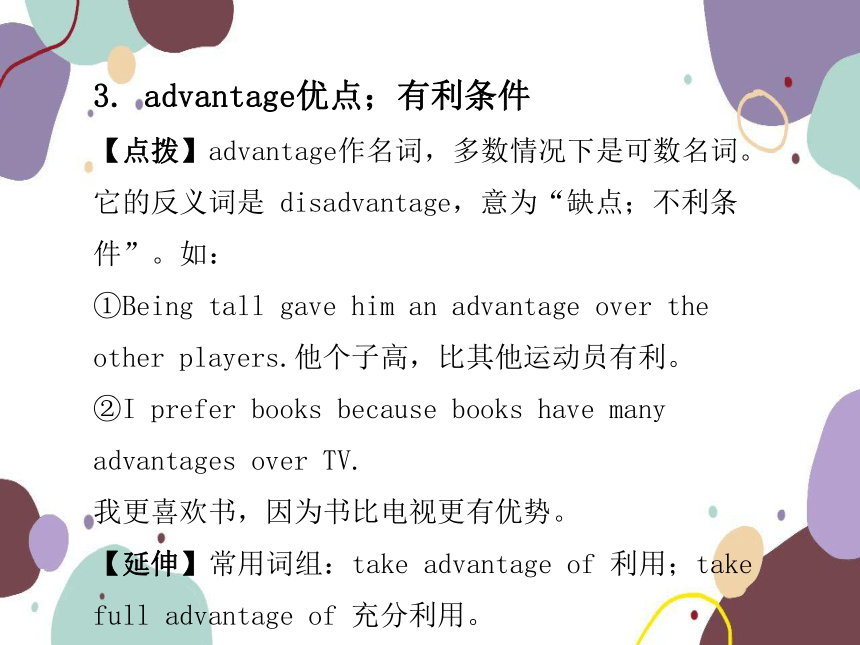
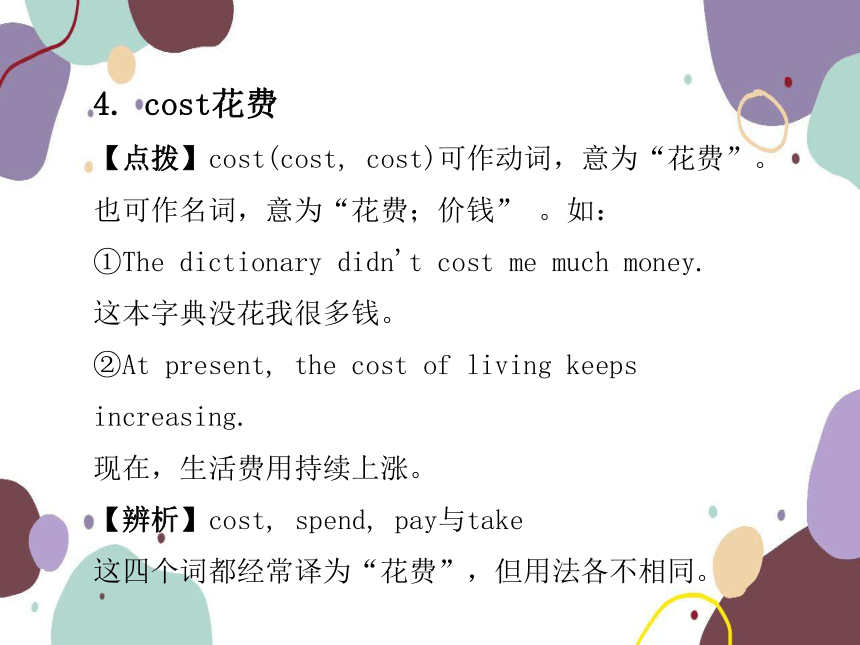
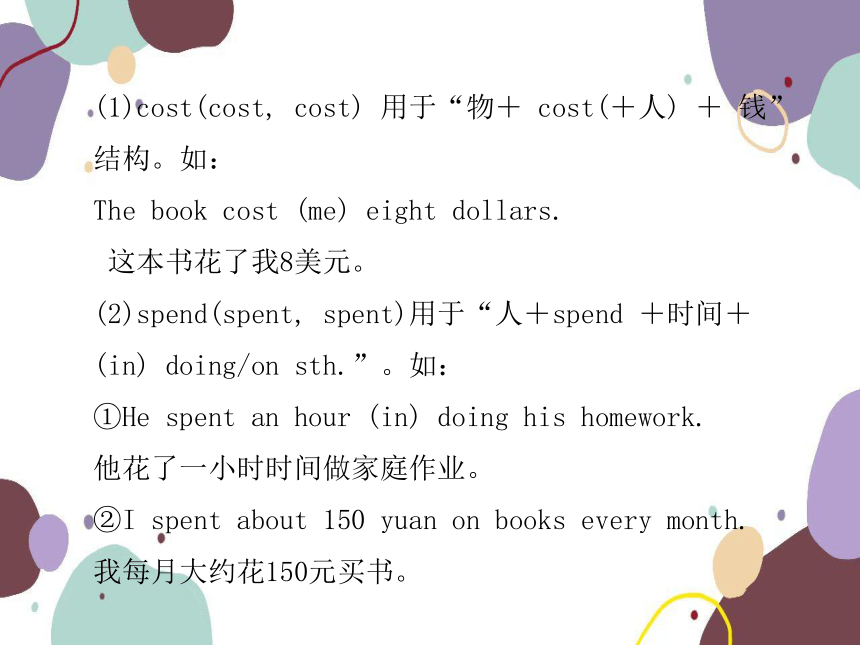

文档简介
(共15张PPT)
Unit 13 We're trying to save the earth!
Period 1(Section A 1a-2d)
教学目标 1. 能谈论各种污染问题及保护环境的方法2. 能阐述引起污染的原因3. 能使用初中英语常见的时态和语态来表达自己的观点4. 能听出各种不同的污染及引起的原因
重点词汇 litter, bottom, fisherman, coal, ugly, advantage, cost, wooden, plastic, make a difference
重点句型 ①We're trying to save the earth.②But it used to be so clean!③Even the bottom of the river was full of rubbish.④Everyone in this town should play a part in cleaning it up!⑤The problem is that people are throwing litter into the river.
难点 To cut down air pollution, we should take the bus or subway instead of driving.
1. litter垃圾;乱扔
【点拨】litter作名词时,意为“垃圾”;作动词时,意为“乱扔”。如:
①People are throwing litter into the river.
人们正在往河里扔垃圾。
②People are also littering in public places like parks.
人们也在像公园那样的公共场所乱扔垃圾。
【延伸】litter作名词时是不可数名词,类似表示“垃圾”的词还有trash, garbage和rubbish。
2. play a part in 在……方面起作用
【点拨】 play a part in(doing) sth.意为“在(做)……方面起作用”。如:
①Everyone in this town should play a part in cleaning it up!在镇里的每个人都应该参与打扫卫生!
②A good diet plays a large part in helping people live longer.
良好的饮食在帮助人们长寿方面起着非常大的作用。
【延伸】play a part in sth.还有“在……中扮演角色”的意思。如:He was invited to play a part in this TV play. 他被邀请参加这个电视剧的演出。
3. advantage优点;有利条件
【点拨】advantage作名词,多数情况下是可数名词。它的反义词是 disadvantage,意为“缺点;不利条件”。如:
①Being tall gave him an advantage over the other players.他个子高,比其他运动员有利。
②I prefer books because books have many advantages over TV.
我更喜欢书,因为书比电视更有优势。
【延伸】常用词组:take advantage of 利用;take full advantage of 充分利用。
4. cost花费
【点拨】cost(cost, cost)可作动词,意为“花费”。也可作名词,意为“花费;价钱” 。如:
①The dictionary didn't cost me much money.
这本字典没花我很多钱。
②At present, the cost of living keeps increasing.
现在,生活费用持续上涨。
【辨析】cost, spend, pay与take
这四个词都经常译为“花费”,但用法各不相同。
(1)cost(cost, cost) 用于“物+ cost(+人) + 钱”结构。如:
The book cost (me) eight dollars.
这本书花了我8美元。
(2)spend(spent, spent)用于“人+spend +时间+(in) doing/on sth.”。如:
①He spent an hour (in) doing his homework.
他花了一小时时间做家庭作业。
②I spent about 150 yuan on books every month.
我每月大约花150元买书。
(3)pay(paid, paid)用于“人+pay+金钱+ for +物”结构。如:
I paid 300 dollars for the mobile phone.
我付了300美元买这部手机。
(4)take(took, taken)用于“it takes(人) +时间+to do”结构。如:
It takes me twenty minutes to walk to school from home. 我从家走路到学校要花20分钟。
1. We're trying to save the earth.
我们正在努力拯救地球。
【点拨】(1)try to do sth.意为“努力或设法做某事”,其否定形式为try not to do sth.,意为“努力或尽力不做某事”。如:
①I'm trying to work out the math problem.
我正设法算出这道数学题。
②Please try not to be late again.
请尽量不要再迟到。
【延伸】(1)try作动词时,还可意为“试;尝试;试用”。如:
—Have you tried this medicine
你试过这种药了吗?
—Yes, I've tried, but it doesn't work.
我已经试过了,但它不起作用。
(2)和try相关的短语还有:
try on试穿 try out尝试;试验
try one's best to do sth.
尽某人最大的努力做某事
have a try试一下
try doing sth. 试着做某事
【点拨】(2)save此处作及物动词,意为“拯救;挽救”。如:
He saved the boy from the fire.
他从火中救出了那个男孩。
【延伸】save作及物动词,还有“储存;贮存;节省”的意思。常用短语:save money攒钱;省钱。如:
I am going to take the bus to save money.
为了省钱,我打算坐公共汽车。
2. To cut down air pollution, we should take the bus or subway instead of driving.
为了减少空气污染,我们应该坐公交或地铁来代替开车。
【点拨】to cut down air pollution属于动词不定式短语作状语表示目的。表目的时,不定式可放在句子的前面,也可放在句子的末尾。但在句子前面时,不定式常用逗号与句子隔开;在句子末尾时一般不用逗号隔开。
如:①To get there on time, we set out at five in the morning.
为了按时到达那儿,我们早上5点就出发了。
②He goes there to enjoy the fresh air.
他去那儿享受新鲜空气。
【辨析】instead与instead of
instead是副词,意为“代替;而不是”。常放在句首或句尾,放在句首常用逗号与句子隔开;instead of后跟名词、代词或动名词,意为“代替……;而不是……”。
如:①Jim didn't buy himself anything. Instead, he bought his mother a scarf.
吉姆没给自己买任何东西,而是给他的妈妈买了一条围巾。
②At last, I decided to cook at home instead of eating outside.
最终我决定在家烧饭,而不在外面吃。
3. There is also too much rubbish and waste.
这里也有太多的垃圾和废品了。
【点拨】too much意为“太多”,后接不可数名词,故用there is。如:
There is too much water in the bottle.
瓶子里水太多了。
【辨析】much too, too much与too many
(1)much too意为“太”,后接形容词或副词。如:He is much too young.他太年轻了。
(2)too much意为“太多”,后接不可数名词。如:
There is too much rain.雨水太多了。
(3)too many也意为“太多”,但后接可数名词复数。如:
There are too many students in our class.
我们班有太多的学生。
Unit 13 We're trying to save the earth!
Period 1(Section A 1a-2d)
教学目标 1. 能谈论各种污染问题及保护环境的方法2. 能阐述引起污染的原因3. 能使用初中英语常见的时态和语态来表达自己的观点4. 能听出各种不同的污染及引起的原因
重点词汇 litter, bottom, fisherman, coal, ugly, advantage, cost, wooden, plastic, make a difference
重点句型 ①We're trying to save the earth.②But it used to be so clean!③Even the bottom of the river was full of rubbish.④Everyone in this town should play a part in cleaning it up!⑤The problem is that people are throwing litter into the river.
难点 To cut down air pollution, we should take the bus or subway instead of driving.
1. litter垃圾;乱扔
【点拨】litter作名词时,意为“垃圾”;作动词时,意为“乱扔”。如:
①People are throwing litter into the river.
人们正在往河里扔垃圾。
②People are also littering in public places like parks.
人们也在像公园那样的公共场所乱扔垃圾。
【延伸】litter作名词时是不可数名词,类似表示“垃圾”的词还有trash, garbage和rubbish。
2. play a part in 在……方面起作用
【点拨】 play a part in(doing) sth.意为“在(做)……方面起作用”。如:
①Everyone in this town should play a part in cleaning it up!在镇里的每个人都应该参与打扫卫生!
②A good diet plays a large part in helping people live longer.
良好的饮食在帮助人们长寿方面起着非常大的作用。
【延伸】play a part in sth.还有“在……中扮演角色”的意思。如:He was invited to play a part in this TV play. 他被邀请参加这个电视剧的演出。
3. advantage优点;有利条件
【点拨】advantage作名词,多数情况下是可数名词。它的反义词是 disadvantage,意为“缺点;不利条件”。如:
①Being tall gave him an advantage over the other players.他个子高,比其他运动员有利。
②I prefer books because books have many advantages over TV.
我更喜欢书,因为书比电视更有优势。
【延伸】常用词组:take advantage of 利用;take full advantage of 充分利用。
4. cost花费
【点拨】cost(cost, cost)可作动词,意为“花费”。也可作名词,意为“花费;价钱” 。如:
①The dictionary didn't cost me much money.
这本字典没花我很多钱。
②At present, the cost of living keeps increasing.
现在,生活费用持续上涨。
【辨析】cost, spend, pay与take
这四个词都经常译为“花费”,但用法各不相同。
(1)cost(cost, cost) 用于“物+ cost(+人) + 钱”结构。如:
The book cost (me) eight dollars.
这本书花了我8美元。
(2)spend(spent, spent)用于“人+spend +时间+(in) doing/on sth.”。如:
①He spent an hour (in) doing his homework.
他花了一小时时间做家庭作业。
②I spent about 150 yuan on books every month.
我每月大约花150元买书。
(3)pay(paid, paid)用于“人+pay+金钱+ for +物”结构。如:
I paid 300 dollars for the mobile phone.
我付了300美元买这部手机。
(4)take(took, taken)用于“it takes(人) +时间+to do”结构。如:
It takes me twenty minutes to walk to school from home. 我从家走路到学校要花20分钟。
1. We're trying to save the earth.
我们正在努力拯救地球。
【点拨】(1)try to do sth.意为“努力或设法做某事”,其否定形式为try not to do sth.,意为“努力或尽力不做某事”。如:
①I'm trying to work out the math problem.
我正设法算出这道数学题。
②Please try not to be late again.
请尽量不要再迟到。
【延伸】(1)try作动词时,还可意为“试;尝试;试用”。如:
—Have you tried this medicine
你试过这种药了吗?
—Yes, I've tried, but it doesn't work.
我已经试过了,但它不起作用。
(2)和try相关的短语还有:
try on试穿 try out尝试;试验
try one's best to do sth.
尽某人最大的努力做某事
have a try试一下
try doing sth. 试着做某事
【点拨】(2)save此处作及物动词,意为“拯救;挽救”。如:
He saved the boy from the fire.
他从火中救出了那个男孩。
【延伸】save作及物动词,还有“储存;贮存;节省”的意思。常用短语:save money攒钱;省钱。如:
I am going to take the bus to save money.
为了省钱,我打算坐公共汽车。
2. To cut down air pollution, we should take the bus or subway instead of driving.
为了减少空气污染,我们应该坐公交或地铁来代替开车。
【点拨】to cut down air pollution属于动词不定式短语作状语表示目的。表目的时,不定式可放在句子的前面,也可放在句子的末尾。但在句子前面时,不定式常用逗号与句子隔开;在句子末尾时一般不用逗号隔开。
如:①To get there on time, we set out at five in the morning.
为了按时到达那儿,我们早上5点就出发了。
②He goes there to enjoy the fresh air.
他去那儿享受新鲜空气。
【辨析】instead与instead of
instead是副词,意为“代替;而不是”。常放在句首或句尾,放在句首常用逗号与句子隔开;instead of后跟名词、代词或动名词,意为“代替……;而不是……”。
如:①Jim didn't buy himself anything. Instead, he bought his mother a scarf.
吉姆没给自己买任何东西,而是给他的妈妈买了一条围巾。
②At last, I decided to cook at home instead of eating outside.
最终我决定在家烧饭,而不在外面吃。
3. There is also too much rubbish and waste.
这里也有太多的垃圾和废品了。
【点拨】too much意为“太多”,后接不可数名词,故用there is。如:
There is too much water in the bottle.
瓶子里水太多了。
【辨析】much too, too much与too many
(1)much too意为“太”,后接形容词或副词。如:He is much too young.他太年轻了。
(2)too much意为“太多”,后接不可数名词。如:
There is too much rain.雨水太多了。
(3)too many也意为“太多”,但后接可数名词复数。如:
There are too many students in our class.
我们班有太多的学生。
同课章节目录
- Unit 1 How can we become good learners.
- Section A
- Section B
- Unit 2 I think that mooncakes are delicious!
- Section A
- Section B
- Unit 3 Could you please tell me where the restroom
- Section A
- Section B
- Unit 4 I used to be afraid of the dark.
- Section A
- Section B
- Unit 5 What are the shirts made of?
- Section A
- Section B
- Review of Units 1-5
- Unit 6 When was it invented?
- Section A
- Section B
- Unit 7 Teenagers should be allowed to choose their
- Section A
- Section B
- Unit 8 It must belong to Carla.
- Section A
- Section B
- Unit 9 I like music that I can dance to.
- Section A
- Section B
- Unit 10 You're supposed to shake hands.
- Section A
- Section B
- Review of Units 6-10
- Unit 11 Sad movies make me cry.
- Section A
- Section B
- Unit 12 Life is full of the unexpected
- Section A
- Section B
- Unit 13 We're trying to save the earth!
- Section A
- Section B
- Unit 14 I remember meeting all of you in Grade 7.
- Section A
- Section B
- Review of Units 11-14
